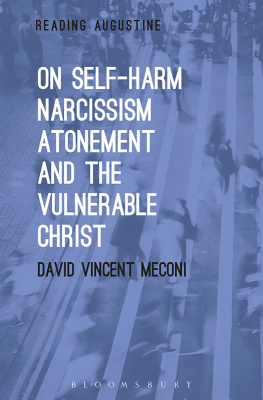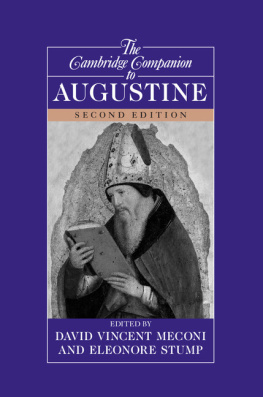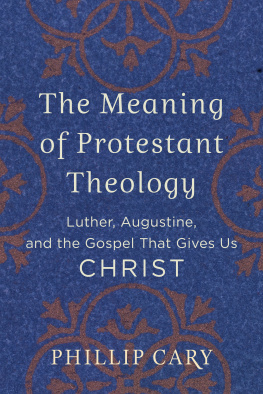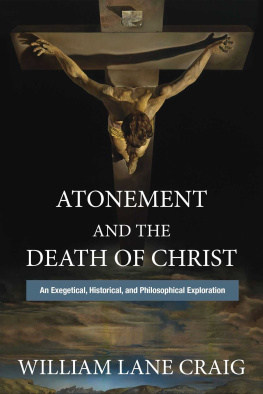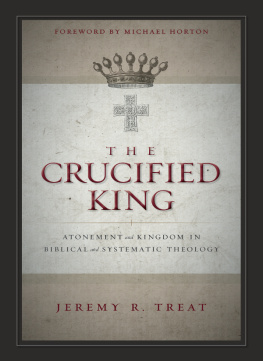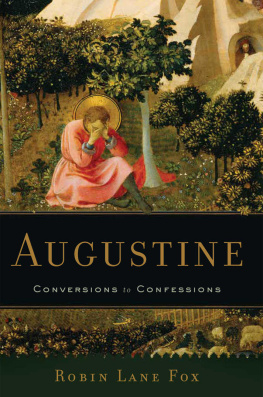ON SELF-HARM, NARCISSISM, ATONEMENT, AND THE VULNERABLE CHRIST
ON SELF-HARM, NARCISSISM, ATONEMENT, AND THE VULNERABLE CHRIST
By David Vincent Meconiby

Reading Augustine
Series Editor:
Miles Hollingworth
Reading Augustine offers personal and close readings of St. Augustine of Hippo from leading philosophers and religious scholars. Its aim is to make clear Augustines importance to contemporary thought and to present Augustine not only or primarily as a pre-eminent Christian thinker but as a philosophical, spiritual, literary, and intellectual icon of the West.
Volumes in the series:
ON ETHICS, POLITICS AND PSYCHOLOGY IN THE TWENTY-FIRST CENTURY
John Rist
ON LOVE, CONFESSION, SURRENDER AND THE MORAL SELF
Ian Clausen
ON EDUCATION, FORMATION, CITIZENSHIP AND THE LOST PURPOSE OF LEARNING
Joseph Clair
ON CREATIVITY, LIBERTY, LOVE AND THE BEAUTY OF THE LAW
Todd Breyfogle
ON MUSIC, SENSE, AFFECT AND VOICE
Carol Harrison
ON CONSUMER CULTURE, IDENTITY, THE CHURCH AND THE RHETORICS OF DELIGHT
Mark Clavier
ON GOD, THE SOUL, EVIL AND THE RISE OF CHRISTIANITY
John Peter Kenney
desiderantibus evanescere
It is hard to overestimate the importance of Augustines work, both in his own period as well as in the subsequent history of Western philosophy. Until the thirteenth century, when he may have had a competitor in Thomas Aquinas, Augustine was the most important philosopher of the medieval period; and the impact of his thought continued through the Reformation to our own day. Many of his views, including his theory of the state, his account of time and eternity, his understanding of the will, his attempted resolution of the problem of evil, his exposition of Gods knowledge, his theory of language, his approach to the relation of faith and reason, and his investigations into the human psyche have remained influential up till the present time.
One thing that is distinctive about Augustines thought and that makes it sound disconcertingly contemporary is his insightfulness into the complexity of the human psyche. The fragmentation of the self is a recurrent theme in his work, and he is perceptive about the distance introduced into human relations with others because of the internally divided human psyche. What is even more impressive about his keen observations is his account of the self-alienation resulting from such internal divisions in the self. Augustines idea that a self-alienated person will loathe himself and in fact will seek determinedly his own destruction is striking.
Although all of Augustines work has been the subject of extensive scholarly study and reflection, there has been less investigation of Augustines powerful observations about self-loathing. And yet in our own time we certainly are in a position to appreciate his wisdom in this regard. How is it possible that a human being would find comfort in cutting herself? How is it possible that a person would return repeatedly to an abuser? Or to self-undermining addictive behavior? The answers to these and similar questions require not just a psychoanalytic theory of human self-destructiveness; they need explication from within a whole worldview that undergirds a distinctive account of human nature and the true self of a human person. And that is what David Vincent Meconi, S.J., has undertaken to do in this new book on Augustines philosophical and theological account of the human psyche. Meconi is a well-known Patristics scholar whose previous work has focused on the thought of Augustine. His many articles and books on Augustine have tended to concentrate on Augustines account of the human person, and that extensive expertise is in evidence in this new book on Augustine and self-harm.
Meconi begins by describing in detail Augustines view of the world and of human beings in the world. Foundational to all Augustines understanding of human nature is the belief that the world has a Creator and that human beings are made in his image. What is noteworthy about Augustines view is the additional claim that human beings are made for union with their Creator. A human person is not only made by God but is also meant to be united to God in the giving and receiving of love.
On Augustines view, as Meconi painstakingly shows, without this relation to a loving God a human person tends to fall apart, to want and not want the same things in internal fragmentation. For Augustine, a human person in this condition is in effect trying unsuccessfully to be self-sufficient, to be for himself what God should be for him. He is thus in effect trying to be God for himself. But the effect of this effort is the opposite of what a human person is intended to be. As Augustine sees it, a human person is by nature suited for deification in union with his Creator. In turning his back on his Creator to become sufficient for himself, a human person becomes not more than human but less. Like Narcissus in the old myth, a human person who rejects the love of God becomes destructive to himself.
Meconi focuses on the much-discussed episode in Augustines Confessions of the theft of pears to highlight both the oddity and the insight of Augustines view of that theft. As Augustine tries to show through his probing questions about that theft, the person in love with himself apart from God is in effect loathing himself through his self-love. True self-love is manifest in the giving and receiving of love in union with God. Apart from that union, self-love and self-loathing are yoked so that a person seeks the self-destruction he hates. Meconis ability to describe and defend Augustines position elucidates Augustines view of the human predicament so that it resonates with contemporary concerns. When the great wealth of the industrialized and secularized Western nations leaves those nations also with high rates of suicide and depression, Meconis presentation of Augustines analysis of the human condition is apt for our times.
In the books last chapter, Meconi brings into the discussion Augustines view of the central doctrines of Christianity, the Incarnation and atonement of Christ. In his sensitive explanations of a complicated part of Augustines thought, Meconi makes evident that, for Augustine, human beings cannot by themselves conquer their tendency to spiral into self-destruction. The richness of this part of Meconis work defies any easy summary. He sketches Augustines views of the distinction between self-loathing and self-denial, the historical importance of Christs crucifixion and its on-going impact on the Church, the role of surrender in self-fulfillment, and the communal nature of human well-being. The importance of Augustines views on these topics to current thought is evident, and Meconis expert exposition of Augustines views illuminates them and sets them in the broader context of Augustines whole worldview.
The result of Meconis labors is thus an excellent book. With his far-ranging familiarity with the works of Augustine, from the letters and sermons to the major treatises, Meconi makes Augustines thought alive and intelligible so that it becomes available for wrestling with now. This book will make a difference to all those who care about Augustine or the topics that moved him and that animate us still.
Dr. Eleonore Stump
Robert J. Henle Chair in Philosophy
Saint Louis University
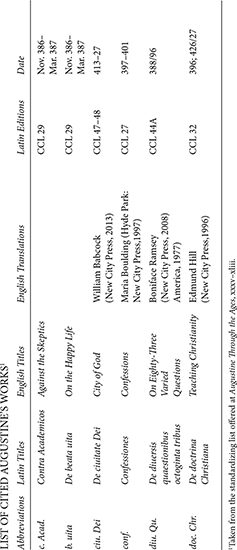
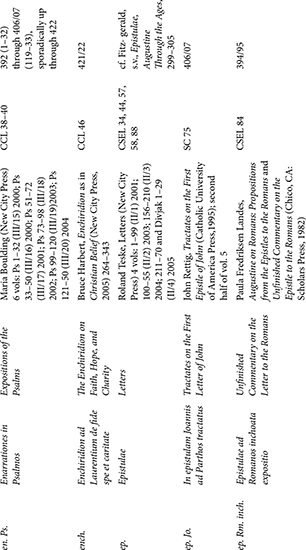
Next page
